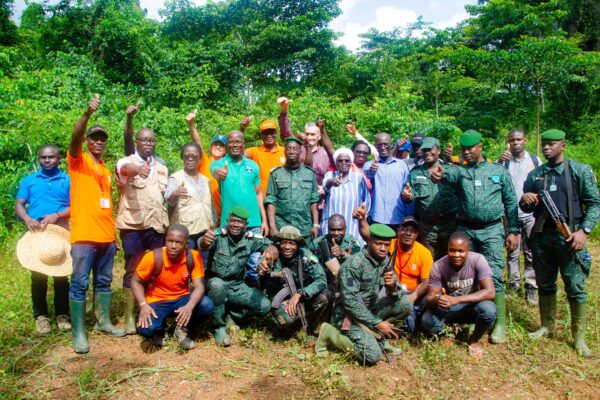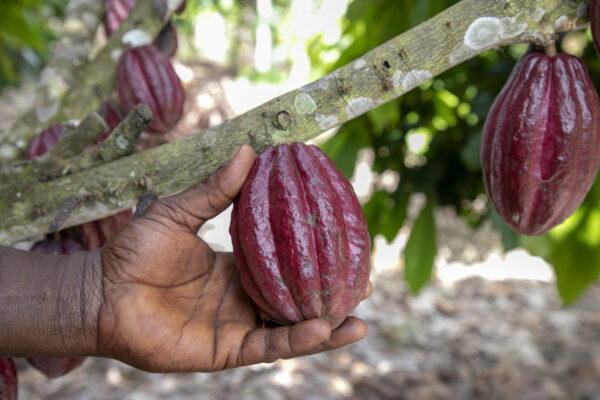Early last year TFT announced a new project in Tocache, Peru. Now work is set to begin transforming the lives of smallholder farmers in the region with our member Grupo Palmas and its suppliers.
San Martín, Perú – Palm oil is essential for smallholders farmers in Tocache in the San Martín region of Peru. It provides a way of life, but many who produce it lack access to basic services, have limited knowledge of good farm management and face other daily challenges. Early last year, TFT, jointly with Grupo Palmas and Nestlé, both TFT members, launched a project to understand the challenges faced by smallholders who supply Grupo Palmas. Now, work to transform their livelihoods is set to begin.
From coca to palmPalm oil came to Tocache in San Martín in the late 1970s. But for several years, coca, the key derivative in the production of cocaine, was grown by farmers in the region and terrorism racked the area. At its peak, it was estimated that there were around 18 thousands hectares of coca grown in the region. Due to its instability, many farmers and their families fled and abandoned their land.
Since then, oil palm and cocoa have taken over, due to large-scale coca eradication and the promotion of these alternatives. San Martín is now the largest oil palm producer in Peru, providing 62 percent of the country’s production. Today, 68 percent of the study zone is dedicated to palm cultivation and drug production and trafficking has decreased. According to official reports, only around 77 hectares of coca were grown in 2016.
But for the smallholder farmers who have decided to stay in Tocache, the influx of palm oil has brought both new challenges and opportunities. Working closely with Grupo Palmas’ Cadenas Productivas initiative, TFT’s Rurality programme carried out a recent study with 48 smallholders, called the Rural Dynamic Diagnostic (RDD), which found that palm oil provides 54 percent of farmers with their main source of income. Many farmers, however, also have low palm production rates, lack access to clean, drinkable water, and have limited knowledge of good farm management, among other things.
To give an example, the study found that many farmers produce cocoa as a secondary product, in fact San Martín is the largest cocoa-producing area in the entire country, accounting for nearly half of Peru’s total production. While this can provide a way to gain additional incomes, it was frequently found that poor crop management undermines production.
Turning these challenges into opportunities is the goal of TFT’s Rurality project in Tocache, which will collaborate with Grupo Palmas and its Cadenas Productivas initiative, which was launched to increase sustainability and transparency among smallholders as well as boost the productivity and income of farmers working in the company’s palm oil supply chain.
Bringing resilience and livelihoods
“Rurality aims to bring out the entrepreneurial spirit that we believe all farmers have,” explained Bruno Montesinos, a Rurality project officer at TFT. “By supporting farmers to diversify their crops, improve their farm practices and forge better connections in the supply chain, our objective is to make farmers more resilient and improve their livelihoods.”
In Tocache, this will mean coaching farmers to improve their farm management and also find potential avenues for them to use cocoa sub-products which could increase yields and income simultaneously. One farmer from Uchiza, whose main income earner is cocoa, expressed an interest in learning how to create organic fertiliser for his crops. Supporting farmers in this way is key to the initiative.
“Another critical point is farmers’ health,” Bruno continued. Many farmers burn plastic pesticide or fertiliser containers on their farms, while of the farmers interviewed during the RDD over two-thirds have no access to drinking water. A farmer from the Pólvora district explained there had been two cases where pest controllers were poisoned after using a banned pest product: “They started to vomit after applying it. They only used a piece of fabric to cover their mouths when working.”
“We’ll explore these issues with the farmers and discuss how they can change their practices as the project progresses,” Bruno added. Smallholders’ failure to use Personal Protection Equipment is a common challenge in the rural world.
Rurality and Grupo Palmas’ vision for the region also encompasses the natural environment, and working with farmers to preserve it. Many farmers in the region are not aware of the importance of preserving forests. Groundwork by TFT has identified important High Carbon Stock and High Conservation Value forest areas, such as the nearby Cordillera Azul national park. “Working with farmers and Grupo Palmas to change practices and perceptions could offer a way to protect this,” Bruno said.
Many farmers also have aguajales, or swamp palm, on their land, but are unaware of its importance for water availability and as a carbon stock. One farmer from Loboyacu explained that two years before a part of the area used to be aguajales, but she and other farmers cut it down to plant oil palm. “We still have five more hectares to cut,” she told Rurality field officers.
Ultimately, the project aims to bring change at scale to as many farmers as possible within Grupo Palmas’ supply chain and then broaden the scope to transform lives across the entire region. “It’s a lot of work, but we, and the farmers we’ve talked with are motivated to begin. We hope to see great progress,” concluded Bruno.


